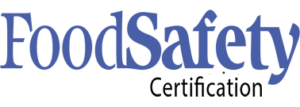Candidates enrolled in food handling, FoodSafe and food safety certification will learn about a variety of topics in the food service industry. Each provincially regulated course is slightly different in course content, however, they have significant amounts of similarities. The following is a list of some of the key topics that will likely be covered in a food safety certification course in your area.
Key Topics about FoodSafe and food safety
- Regulations and by-laws of your local health department
- Legal implications of not adhering to food safety and food handling regulations.
- types of micro-organisms include bacteria, parasites,
- viruses, moulds and yeast
- How bacteria grows including ideal growing environments, growth rate, and resiliency.
- Understanding the signs and symptoms of food poisonings including the delay of onset of symptoms.
- Different types of food borne illnesses including microbiological. Candidates will learn of the different types of this popular form of food borne illness and different methods of contracting it. Candidates will also learn of the various preventative measures to prevent microbiological food borne illnesses.
- Understanding the signs and symptoms of chemical food poisonings. Includes knowledge of preventative techniques and treatment for victims.
- Candidates will learn about allergic reactions and how to recognize and prevent allergic reactions from ingested foods. Candidates will learn of the common food allergies and prevention techniques (such as cross-contamination).
- Safe and unsafe food storing temperatures and food preparation temperatures. This includes the temperature of different types of products that is required to serve after pre-heating or original heating.
- Candidates will learn defrosting and proper food storing techniques.
- Hazards and prevention of cross-contamination.
- Proper kitchen labelling and food storing techniques.
- Sanitation and hygiene techniques including the importance of hand washing and hand washing basins.
- Preventative techniques such as wear gloves and what they can and can not prevent.
- Personal hygiene techniques such as cleanliness and hair nets and other preventative measures.
- Cleaning and sanitizing including utensils, serving plates, kitchen, food storage areas and serving area. Includes machine washing and hand washing techniques for dishes.
- Candidates will learn about sanitary facilities and pest control regulations and standards in their region.
To learn about these topics and understand how to work in or run a safe food establishment take a food handling or food safety certifying course in your area.
